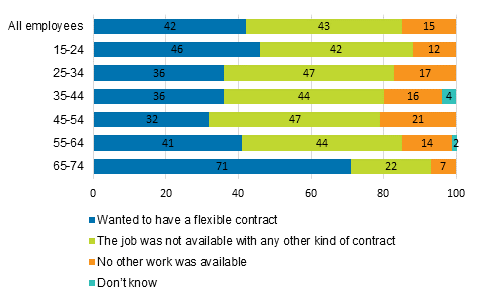Published: 3 June 2019
Around 100,000 employees work on zero-hour contracts
On average, some 106,000 employees worked on zero-hour contracts in 2018. This is around five per cent of all employees aged 15 to 74. Here, a zero-hour contract refers to an employment contract where the minimum working hours promised is zero. Data on persons working on zero-hour contracts were collected for the second time in connection with Statistics Finland’s Labour Force Survey in 2018.
Of employees aged 15 to 74, approximately 106,000 reported that they worked on zero-hour contracts. The prevalence of zero-hour contracts was last surveyed in 2014. Then, there were 89,000 employees aged 15 to 74 working on zero-hour contracts.
Similarly, around 99,000 employees aged 15 to 64 worked on zero-hour contracts in 2018 and some 83,000 in 2014.
About half of the employees with zero-hour contracts were women and about half were men.
Employees working on zero-hour contracts were mostly young people: good one-third (37 %) were aged under 25 and 66 per cent were aged under 34.
Two out of five had chosen the zero-hour contract
Around 40 per cent of persons who worked on zero-hour contracts had wanted this type of a flexible contract. Almost the same share were persons who reported that the work in question was only available on a zero-hour contract and 14 per cent felt that no other work had been available. Slightly more men (44 %) than women (41 %) had wanted this type of contract.
There were most persons for whom the zero-hour contract was a welcome option in the oldest and youngest age groups. There were least such persons in the middle age groups aged 35 to 54 (figure).
Reasons for zero-hour contracts by age, persons aged 15 to 74.

As a general rule, persons working on zero-hour contracts work part-time
Seventy-seven per cent of employees aged 15 to 74 working on zero-hour contracts reported that they worked part-time in 2018. Twenty-three per cent worked full-time.
Usual weekly working hours of all persons working on zero-hour contracts were on average 22 hours per week. The average weekly working hours of those working part-time were 17 hours per week and for full-time employees they were 37 hours per week.
A person working on a zero-hour contract can have either a fixed-term contract or a contract valid until further notice. The majority, 62 per cent, were employed based on an employment contract valid until further notice. Correspondingly, 38 per cent had fixed-term contracts. Data concerning the employment relationship are based on the person’s own reporting.
In absolute numbers, most employees working on zero-hour contracts were found in wholesale and retail trade (17,000), health and social services (15,000) and accommodation and food services (11,000). Relative to the number of wage and salary earners in the industry, zero-hour contracts were most common in accommodation and food services. Fifteen per cent of employees in this industry worked on zero-hour contracts.
The most common professions for persons working on zero-hour contracts were sales persons, personal and care workers, labourers in mining, construction, manufacturing and transport, and service workers.
Close to one-third only know their working hours for a couple of days ahead
Close on one-third (30 %) of persons working on zero-hour contracts did hardly know at all or only a few days in advance the timing of their upcoming working hours. The share was almost the same for those who knew the timing of their working hours at most for a week or two ahead. About 40 per cent knew the timing of their working hours for a month or more ahead. Slightly more men knew the timing of their working hours for a longer time in advance than women.
The number of those working on zero-hour contracts was studied in connection with the Labour Force Survey in 2018 with the question: “Is your employment contract a so-called zero-hour contract where the agreed number of working hours is at the minimum zero hours (e.g. 0 to 40 hours per week)?”
The question concerned only the main job. Data are based on the person’s own reporting. Data on employees working on zero-hour contracts is the annual average.
Reluctance related to the employment contract was asked with the question: "Do you have a zero-hour contract because 1) you wanted to have a flexible contract, 2) this job was not available with any other kind of contract, 3) or because no other job was available?"
The timing of the working hours was examined with the question: “How long in the future can you at the moment anticipate the timing of your coming working hours? 1) hardly at all, 2) for at most a few days ahead, 3) for around one week or a couple of weeks ahead, 4) for about one month ahead, 5) for a longer time ahead.”
More about this topic on the blog
Source: Labour Force Survey 2018. Statistics Finland
Inquiries: Anna Pärnänen 029 551 3795, Hanna Sutela 029 551 2907, tyovoimatutkimus@stat.fi
Director in charge: Jari Tarkoma
Publication in pdf-format (292.9 kB)
- Tables
-
Tables in databases
Pick the data you need into tables, view the data as graphs, or download the data for your use.
- Quality descriptions
-
- Quality Description: Labour force survey (3.6.2019)
Updated 3.6.2019
Official Statistics of Finland (OSF):
Labour force survey [e-publication].
ISSN=1798-7857. Wage and salary earners’ zero-hours contracts 2018. Helsinki: Statistics Finland [referred: 27.10.2025].
Access method: http://stat.fi/til/tyti/2018/15/tyti_2018_15_2019-06-03_tie_001_en.html

